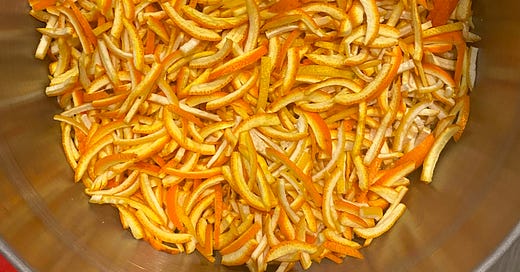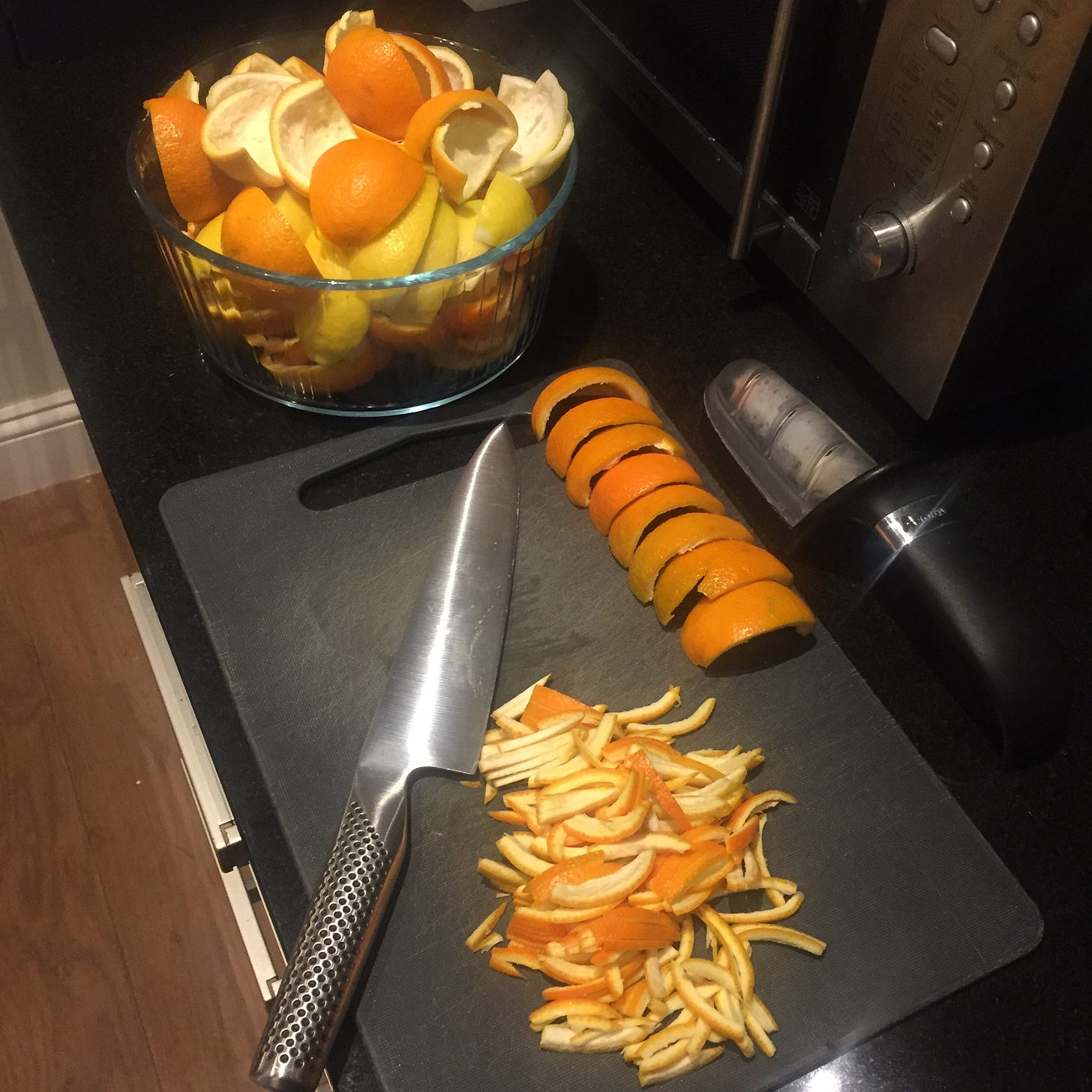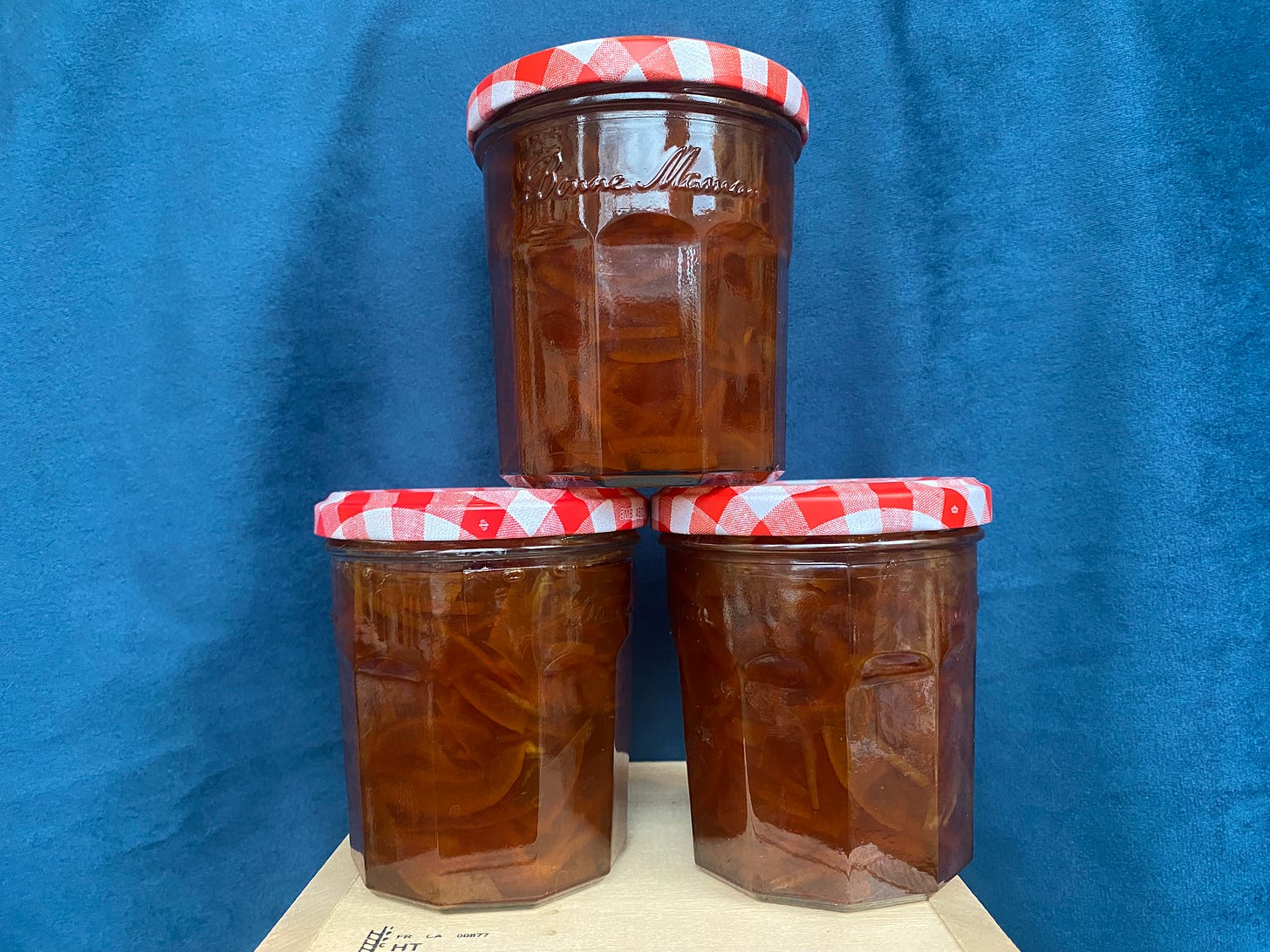Last week marked my annual marmalade making marathon. For a couple of days each January, my kitchen transforms into a mini production line, with me and it increasingly covered in bits of orange, orange juice and sugar as together they transform into a deep orange, tangy, utterly delicious preserve.
It’s a time-consuming process, parts of which are fairly dull and repetitive. So, as I was slicing up the peel of one in a giant pile of oranges, my mind started to wander about the parallels of the process and life. Don’t judge me, that’s just how my mind works 😂
So, with the odd pithy pun worked in (yes, I’m going to #sorrynotsorry) I offer you the fruits of my thinking. Which on reflection, handily doubles as a guide to much of what I’ve learnt over the years about how to make truly excellent marmalade.
In no particular order, here we go:
Seize the moment
Want to make orange marmalade in May? Too bad. Because Seville oranges, the slightly smaller (and sadder looking) variety of oranges that are essential to proper marmalade are only available for a short season from early January to mid February each year.
There’s been years I’ve not made any. When I’ve kept thinking “Oh I’ll do that next weekend” only to discover the oranges are no longer in the shops and I’ve missed my chance. For the things you want, seizing the imperfect moment is usually better than waiting until you’re ready, when it might just be too late.
Be willing to persevere
For the batch of marmalade I make (enough for me for 12 months plus gifts to family and friends), this year I used 35 oranges and 6 lemons. All of which have to be carefully peeled, then the peel sliced into fine slivers ready to be cooked. That’s *a lot* of chopping. You have to concentrate or you end up removing the ends of your fingers, or with random bits of oversized peel (which cook inconsistently). And it’s boring. Really boring.
Yet there aren’t any shortcuts, at least not if you want a really good quality marmalade at the end. The same will always be true for some things we do in life – to do them well will take perseverance through stuff we don’t enjoy. Nonetheless, the end results are worth it. Remembering that helps a lot.
Learn to chop (and get a really nice knife)
Finely chopping the peel of that many oranges and lemons takes a while. And no, it just doesn’t work in a food processor. You know what makes it take much longer? A rubbish knife and a lack of skill using said blade.
Many years back I invested both in some high quality knives and in developing the skills to use them more effectively, and it paid off handsomely.
Investing in yourself, your skills and your tools might feel costly, both in time and money, but it really does pay off in the long term.
Sharpen the knife
On the same theme, when I first made marmalade I would push through the slicing in one marathon session. As I went, the knife would become blunter – orange peel is tough – and the process would get harder and slower as I went.
One year, it suddenly occurred to me I could sharpen the knife as I go. So I tried it, and after every 4-5 oranges sliced I’d pause, wash the knife, sharpen it then begin again. I could feel the difference immediately. It might have felt as if I was wasting time in the moment, but the difference it made to the process was worth it. Sharpen your own saw, and you might just glide through life a little easier and more enjoyably.
As an aside, I’m very much hoping the knife references don’t trigger this email to end up in everyone’s junk mail box 😂
Squeeze out the juice (joy)
Something I love about making marmalade is that every single piece of the orange is used. The peel is chopped, cooked and softened to add texture. The juice is squeezed to be cooked in with the sugar. And any remaining pith and the squeezed out pulp is added to a muslin bag, soaked in the peel and juice overnight, then boiled for an hour to extract the pectin to help the marmalade set.
Every little bit of flavour and value is squeezed out of the fruit and contributes to the joy. There’s a metaphor in there about discovering joy in the process, not just the end result of any endeavour. And in looking at how we squeeze joy out of everything and anything we do. Grinding through life hoping for gratification sometime in the future is a lot less fun.
Patience is rewarded
You can’t rush marmalade. I have to be patient to wait for the oranges to be in season, to carefully slice the peel, to allow the peel, pith, pulp and juice to soak overnight then boil, and thenpatiently watch through the boiling process as the liquid gradually boils off and it reaches a setting consistency.
Yet the reward at the end is worth every moment.
If I get frustrated about the slowness, it only stops me enjoying the process. Yet when I immerse myself in it, I can become fascinated by how oranges, sugar and water can transform simply with time, effort and heat. It really is a lesson in chemistry, just as Elizabeth Zott describes in Bonnie Garmus' novel of the same name.
When we stop rushing through tasks, projects and life, we might just find joy and fascination in the moments along the way.
Embrace the (sticky) mess
I’m not great with mess. I like a tidy and clean kitchen (and life), and marmalade produces the absolute opposite of that. The method I use – remove the peel first – means that you’re squeezing just the pulp of the oranges and lemons to remove the juice. If you’ve ever tried that you’ll understand me when I say the juice gets everywhere.
When I first made marmalade, I’d try and clean up as I went. Not only did this not work, as the kitchen was immediately messy again, but it was such a waste of time. These days I embrace the mess. I put on some older clothes, wear an apron and just get stuck in. There’s something glorious in simply not caring for a while and leaning into the whole messy experience. Just like in life, I can let go of the control for a while and embrace a bit of chaos occasionally, I might even find it fun.
Spread the love
While I do eat quite a lot of marmalade, one of the biggest joys is to be able to give it to other people, sometimes those experiencing home-made marmalade for the first time. Because it really is on another level to almost anything available to buy.
They’re little, bright orange pots of love that I can give away. Spreading the joy of that, the fruits of my own toil, really is a wonderful feeling. And that applies equally to my non marmalade-making endeavours in life too.
So there you have it. My juicy take on life lessons from making marmalade. Is it a bit saccharine in places? Perhaps. But I’ve had fun writing it and I hope you’ll take something from it too. Even if that’s just a craving for marmalade. On which note, I’m off to have lunch.
If you fancy giving it a go yourself, and can still find some Seville oranges, this is the recipe I use.
Let me know what you think, whether, questions, comments, violent disagreement on how to make marmalade. If you’re not a marmalade fan, sorry but there’s not a lot I can do! Though also, why not?
And no post on marmalade would be complete without reference to a certain bear who is (quite understandably) obsessed with the stuff. Enjoy!
And finally…
I couldn’t find a marmalade related meme, but instead went for the theme of just getting stuck in.
I hope you enjoyed this week’s Substack. See you next week for “What I’ve been reading…” where we’ll take a look at Leadership is Language by L. David Marquet.
If you know someone who you think would enjoy this, use this button to share it with them directly.







